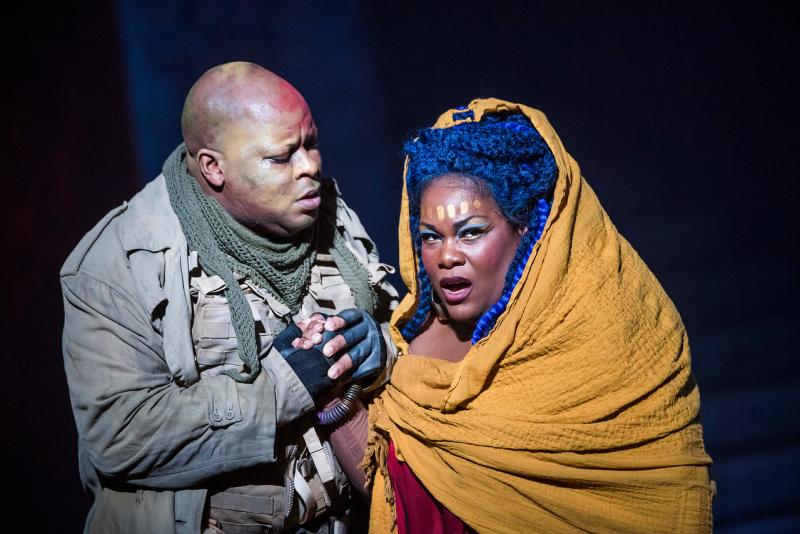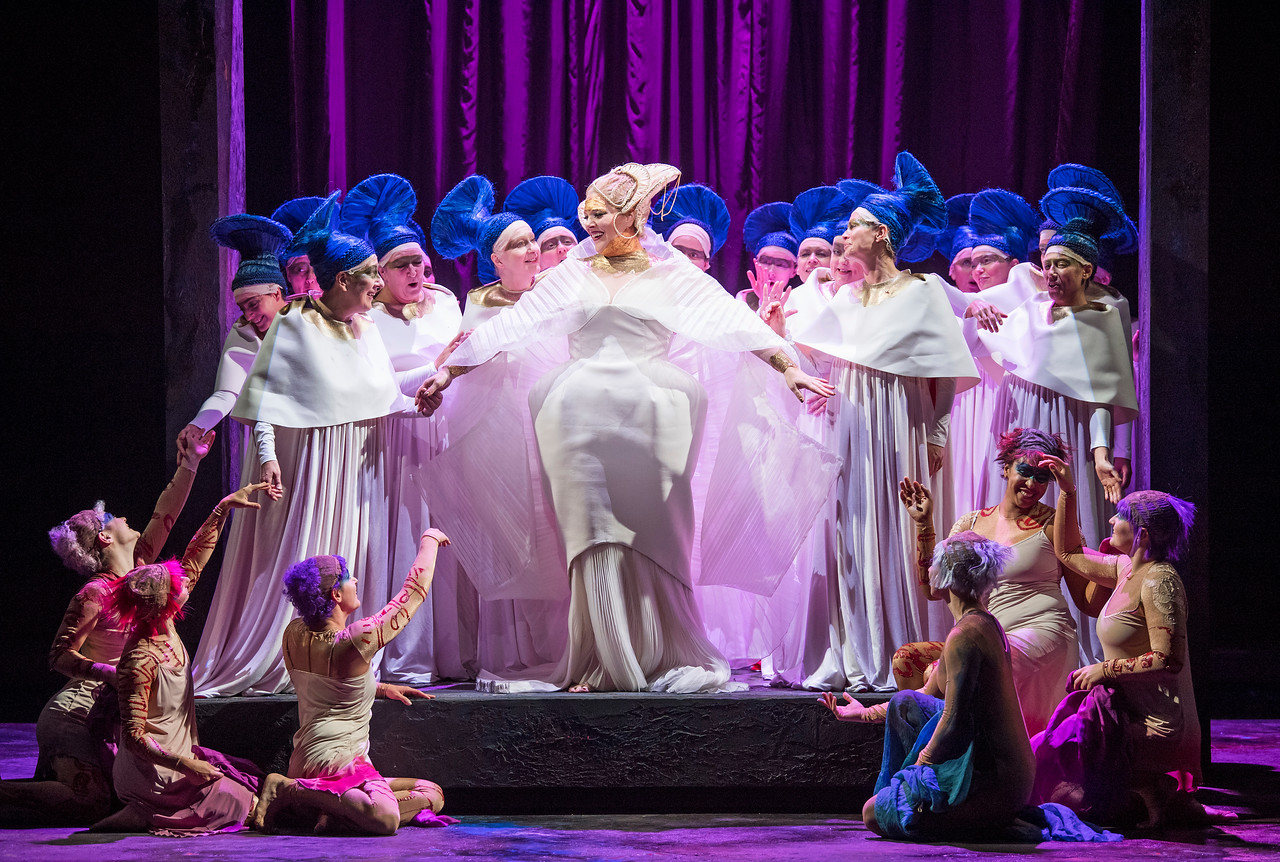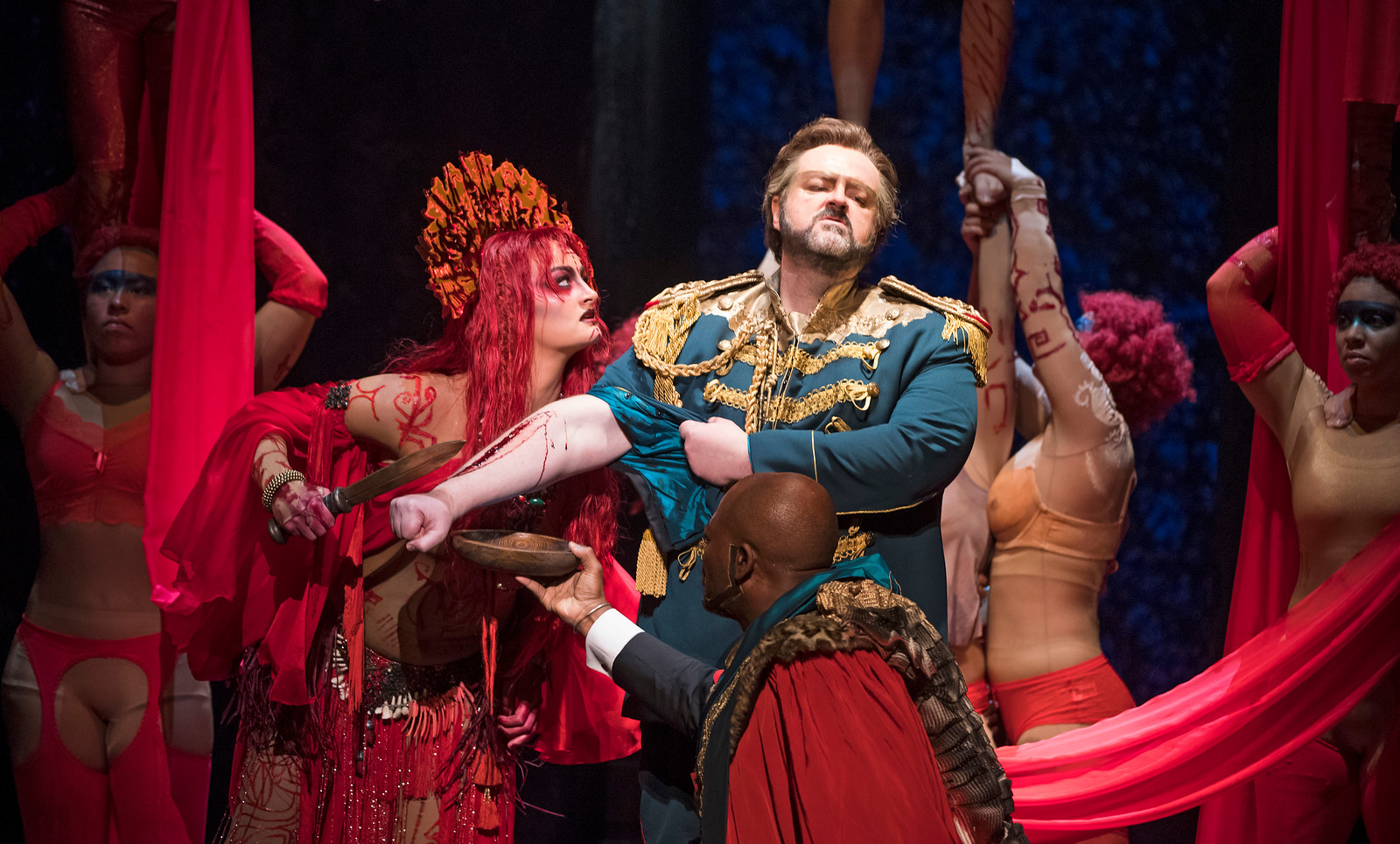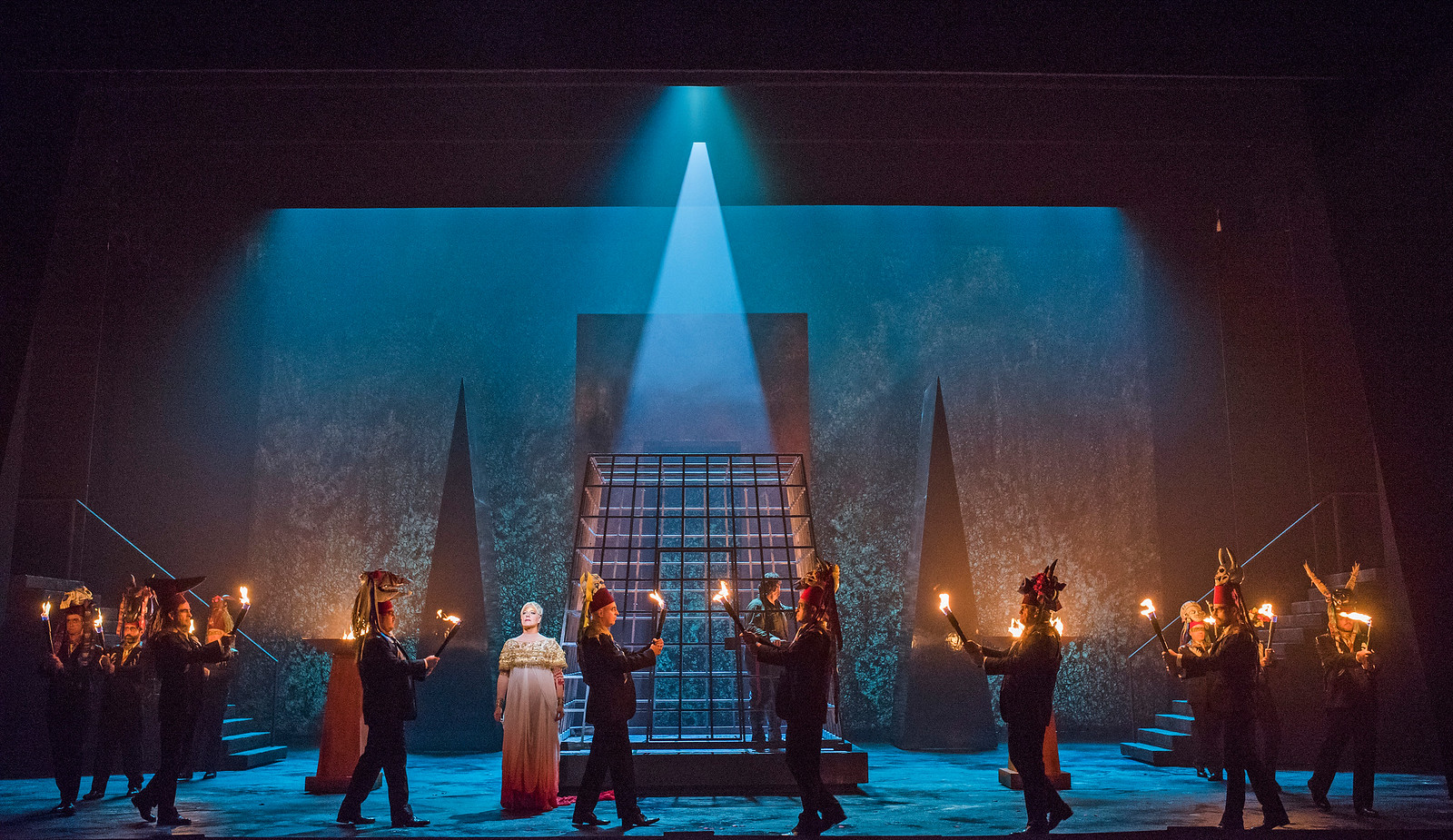Aida, English National Opera review - heroine almost saves a dismal day | reviews, news & interviews
Aida, English National Opera review - heroine almost saves a dismal day
Aida, English National Opera review - heroine almost saves a dismal day
Phelim McDermott's static and shallow production hosts one glorious performance

If the best is the enemy of the good, then the excellent is also the enemy of the "meh". And if you can stomach Verdi's Aida, go and see English National Opera’s new production for its central performance by Latonia Moore.
Aida and Princess Amneris both love the Egyptian military hero Radames. He loves Aida, so the jealous Amneris decides to destroy them both. Aida’s father, King Amonasro of Ethiopa, captured and hiding his identity, turns her into a honey-trap to get military secrets from Radames, who is tried for treason and ultimately buried alive; Aida hides in his tomb to die with him. The strong simplicity of plot that so endears this opera to its public is also problematic, because if interpretations lack subtlety, in part it’s the fault of Verdi and his librettist Antonio Ghislanzoni: the characters are scarcely more rounded than a pantomime’s. It is down to director and cast to give them some convincing depth. Still, there’s spectacle, and everyone loves spectacle, except they might love this one a little bit less. It has its moments. The large, static choral scenes match the monolithic shapes of Tom Pye’s sets to some degree, there are some pretty colours, with rippling silk effects created by Basil Twist; and the beautiful, slanted, varied lighting by Bruno Poet is the subtlest thing on stage. But too often the static direction becomes almost ossified. Kevin Pollard’s timeless costumes don’t always help. Elaborate hieroglyph-inspired head-pieces, exotic venerations of Isis (ancient goddess, not so-called Islamic State), and Radames’s rather 19th century military uniform sit awkwardly with otherwise updated imagery and poor old Amneris is trussed into a white contraption that might have looked happier in 1970s science fiction (Michelle DeYoung's Amneris pictured above with attendants).
Still, there’s spectacle, and everyone loves spectacle, except they might love this one a little bit less. It has its moments. The large, static choral scenes match the monolithic shapes of Tom Pye’s sets to some degree, there are some pretty colours, with rippling silk effects created by Basil Twist; and the beautiful, slanted, varied lighting by Bruno Poet is the subtlest thing on stage. But too often the static direction becomes almost ossified. Kevin Pollard’s timeless costumes don’t always help. Elaborate hieroglyph-inspired head-pieces, exotic venerations of Isis (ancient goddess, not so-called Islamic State), and Radames’s rather 19th century military uniform sit awkwardly with otherwise updated imagery and poor old Amneris is trussed into a white contraption that might have looked happier in 1970s science fiction (Michelle DeYoung's Amneris pictured above with attendants).
No elephants. Instead, the triumphal march accompanies the return of some coffins. Arguably, of course, it is a grotesque moment: Aida’s people have been defeated, her father has been taken prisoner, and her enslaver is stealing her lover. So it’s valid – but grim nonetheless. Radames enters at the height of it to flurries of red bits of paper (plus audible pops as they’re released). Redemption could be found in the team of fabulous on-stage trumpeters. None of the visuals would matter if the characters were fully explored and their interactions were vivid, but few were the moments when that happened; and instead of addressing one another, they mostly had to stand metres apart and bark forwards. Some crucial scenes barely featured eye contact.
None of the visuals would matter if the characters were fully explored and their interactions were vivid, but few were the moments when that happened; and instead of addressing one another, they mostly had to stand metres apart and bark forwards. Some crucial scenes barely featured eye contact.
Michelle DeYoung’s Amneris never lost her regal stance or full tone, but so much more could be made of her inner conflict, terrible jealousy and, above all, the sonic colours of this huge role. Tenor Gwyn Hughes Jones (pictured above) carried the role of Radames well and was strong vocally, with plenty of ping in the high notes, yet even he could not quite transcend the cardboard cut-out direction. Amonasro was the South African bass-baritone Musa Ngqungwana, making his UK debut, with excellent, warm tone, but perhaps without quite the requisite power of presence. The Egyptian King, Matthew Best, again sang creditably, but with scant personality. Eleanor Dennis, an ENO Harewood Artist, was notable as a Priestess with seductively beautiful tone. Despite good individual components, the whole failed to ignite; the final scene, with Aida and Radames united in the tomb and the regretful Amneris above them, nevertheless moved onto another level, taking Verdi on his own terms at last. The chorus mostly stood and delivered, which they did extremely well, with the hushed moments especially fine. There was strong playing from the orchestra under the baton of Keri-Lyn Wilson, who took often brisk tempi and provided solid support to her soloists’ voices, mainly without drowning them in orchestral splendour and cavernous Coliseum space.
The chorus mostly stood and delivered, which they did extremely well, with the hushed moments especially fine. There was strong playing from the orchestra under the baton of Keri-Lyn Wilson, who took often brisk tempi and provided solid support to her soloists’ voices, mainly without drowning them in orchestral splendour and cavernous Coliseum space.
There is one elephant in the theatre: it’s Verdi in English. Or Verdi in this English. Some composers translate better than others, and Verdi is one of the thorniest of all. Even so, this version is so clunky that it not only disrupts occasional rhythms but also distracts from its purpose, which presumably is to make the drama more immediate. Aida shouldn’t leave you laughing – but when rhyming couplets match “Isis” with “[in]side us”, and “shelter” with “Delta”, splashed loud and clear over the surtitles, you can’t help thinking that ENO’s opera-in-English mandate is past its sell-by date.
Add comment
The future of Arts Journalism
You can stop theartsdesk.com closing!
We urgently need financing to survive. Our fundraising drive has thus far raised £49,000 but we need to reach £100,000 or we will be forced to close. Please contribute here: https://gofund.me/c3f6033d
And if you can forward this information to anyone who might assist, we’d be grateful.

Subscribe to theartsdesk.com
Thank you for continuing to read our work on theartsdesk.com. For unlimited access to every article in its entirety, including our archive of more than 15,000 pieces, we're asking for £5 per month or £40 per year. We feel it's a very good deal, and hope you do too.
To take a subscription now simply click here.
And if you're looking for that extra gift for a friend or family member, why not treat them to a theartsdesk.com gift subscription?
more Opera
 La bohème, Opera North review - still young at 32
Love and separation, ecstasy and heartbreak, in masterfully updated Puccini
La bohème, Opera North review - still young at 32
Love and separation, ecstasy and heartbreak, in masterfully updated Puccini
 Albert Herring, English National Opera review - a great comedy with depths fully realised
Britten’s delight was never made for the Coliseum, but it works on its first outing there
Albert Herring, English National Opera review - a great comedy with depths fully realised
Britten’s delight was never made for the Coliseum, but it works on its first outing there
 Carmen, English National Opera review - not quite dangerous
Hopes for Niamh O’Sullivan only partly fulfilled, though much good singing throughout
Carmen, English National Opera review - not quite dangerous
Hopes for Niamh O’Sullivan only partly fulfilled, though much good singing throughout
 Giustino, Linbury Theatre review - a stylish account of a slight opera
Gods, mortals and monsters do battle in Handel's charming drama
Giustino, Linbury Theatre review - a stylish account of a slight opera
Gods, mortals and monsters do battle in Handel's charming drama
 Susanna, Opera North review - hybrid staging of a Handel oratorio
Dance and signing complement outstanding singing in a story of virtue rewarded
Susanna, Opera North review - hybrid staging of a Handel oratorio
Dance and signing complement outstanding singing in a story of virtue rewarded
 Ariodante, Opéra Garnier, Paris review - a blast of Baroque beauty
A near-perfect night at the opera
Ariodante, Opéra Garnier, Paris review - a blast of Baroque beauty
A near-perfect night at the opera
 Cinderella/La Cenerentola, English National Opera review - the truth behind the tinsel
Appealing performances cut through hyperactive stagecraft
Cinderella/La Cenerentola, English National Opera review - the truth behind the tinsel
Appealing performances cut through hyperactive stagecraft
 Tosca, Royal Opera review - Ailyn Pérez steps in as the most vivid of divas
Jakub Hrůša’s multicoloured Puccini last night found a soprano to match
Tosca, Royal Opera review - Ailyn Pérez steps in as the most vivid of divas
Jakub Hrůša’s multicoloured Puccini last night found a soprano to match
 Tosca, Welsh National Opera review - a great company reduced to brilliance
The old warhorse made special by the basics
Tosca, Welsh National Opera review - a great company reduced to brilliance
The old warhorse made special by the basics
 BBC Proms: The Marriage of Figaro, Glyndebourne Festival review - merriment and menace
Strong Proms transfer for a robust and affecting show
BBC Proms: The Marriage of Figaro, Glyndebourne Festival review - merriment and menace
Strong Proms transfer for a robust and affecting show
 BBC Proms: Suor Angelica, LSO, Pappano review - earthly passion, heavenly grief
A Sister to remember blesses Puccini's convent tragedy
BBC Proms: Suor Angelica, LSO, Pappano review - earthly passion, heavenly grief
A Sister to remember blesses Puccini's convent tragedy
 Orpheus and Eurydice, Opera Queensland/SCO, Edinburgh International Festival 2025 review - dazzling, but distracting
Eye-popping acrobatics don’t always assist in Gluck’s quest for operatic truth
Orpheus and Eurydice, Opera Queensland/SCO, Edinburgh International Festival 2025 review - dazzling, but distracting
Eye-popping acrobatics don’t always assist in Gluck’s quest for operatic truth

Comments
I attended the last